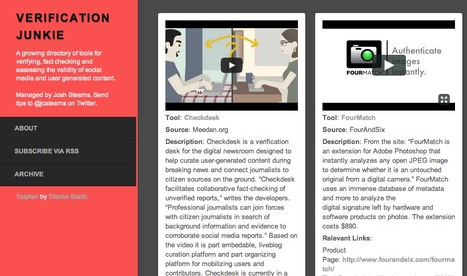Get Started for FREE
Sign up with Facebook Sign up with X
I don't have a Facebook or a X account

 Your new post is loading... Your new post is loading...
 Your new post is loading... Your new post is loading...
Ruveanna Hambrick's curator insight,
October 2, 2014 2:27 PM
This is a great source for knowing how to monitor and filter information on social media sites like Twitter and Facebook. |
Joitske Hulsebosch's curator insight,
May 9, 2013 4:19 AM
Useful tips on how to evaluate information on the internet - mostly from a news verification perspective but can be useful in other situations as well 
Stephen Dale's curator insight,
May 9, 2013 5:09 AM
Some useful tips on how to rebalance the Timeliness vs. Accuracy and Quality equation for information dissemination. A must-read for any user of social media!
Ruveanna Hambrick's curator insight,
October 2, 2014 10:30 AM
This is a good source for knowing how to "crap detect" not only for news websites and blog posts but also for social media claims as well. |











Risorsa utile ( e gratuita) per il Fact-Checking
General useful tools?
This has great resources and has different multi-media links that are great for crap-detecting.